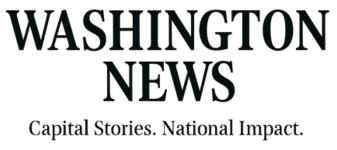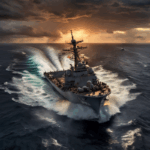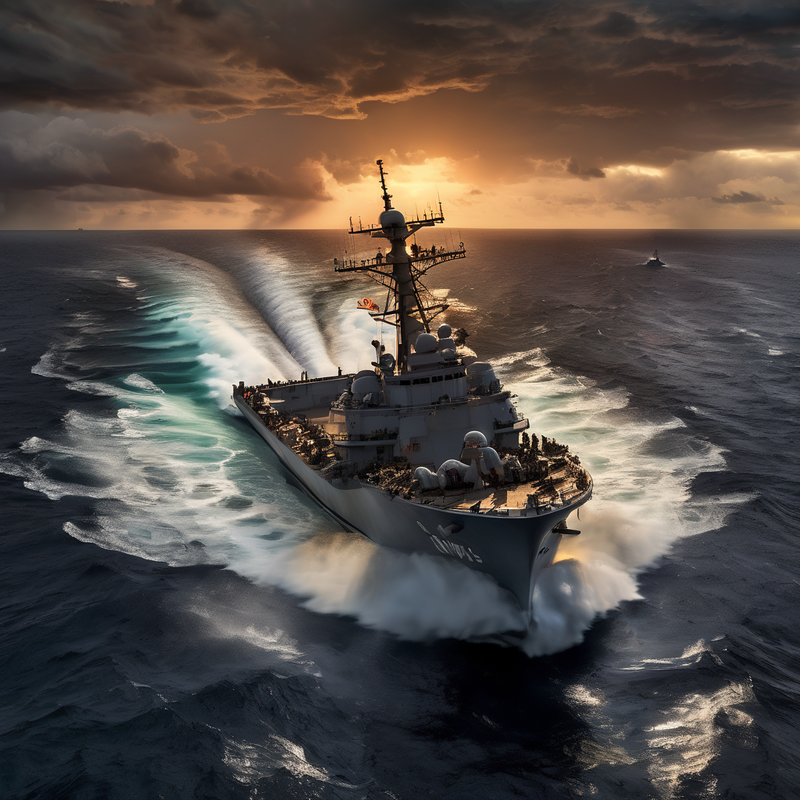Trump Discloses U.S. Targeted a Third Alleged Drug Boat from Venezuela 🚤⚖️
The murky waters of the Caribbean continue to churn with tension as former President Donald Trump announced that the U.S. military has targeted yet another alleged drug boat originating from Venezuela. This revelation comes not as a mere footnote in the ongoing saga of the war on drugs, but as part of a broader geopolitical chess game wherein the pawns are drug traffickers and innocent citizens alike. Can one man’s declaration really turn the tide against narcotics in a region steeped in complex socio-political turmoil? ❓
The U.S. Navy’s actions are reminiscent of a contrived plot from a B-grade action movie, where every twist and turn seems engineered to heighten the drama. But irony drips from the fact that while boats laden with illicit cargo are intercepted, the larger networks of corruption and violence are left largely intact. Amidst this, we must ponder: is the pursuit of narco-traffickers a sincere effort to cleanse the streets of America or merely a theater of war to distract from domestic issues? 🎭
The Context of Drug Trafficking in Venezuela
Venezuela’s struggle with drug trafficking has evolved into a crisis fueled by political instability. The country, which once boasted significant oil wealth, now finds itself mired in economic despair, creating fertile ground for drug cartels to thrive. Influenced by the dual forces of desperation and wealth—much like a magnet attracting iron filings—drug trade in Venezuela has transformed into a lifeline for many and a headache for international authorities.
Venezuela, with its lush jungles and extensive coastlines, offers an almost cinematic backdrop for the operations of drug lords. Imagine the contrast: a beautiful paradise sullied by a cacophony of violence and desperation. The question arises, why are these boats—now deemed as ‘threats’ by the U.S.—allowed to sail under the radar for so long? Are they but decoys in a larger game of geopolitical posturing? 🌍
The Implications of Targeting Drug Boats
The announcement of targeting a third boat may appear to indicate a robust commitment to controlling the drug crisis, but it raises questions about the effectiveness and intentions behind such military interventions. Critics may argue that these operations have less to do with eradicating drugs and more to do with influencing Venezuela’s geopolitical sphere. One might compare this to swatting at flies while a swarm of locusts devours everything in sight. 🐜
More troubling still is the fallout from these actions on the Venezuelan populace. As the U.S. perhaps steps up its naval presence in the Caribbean, are innocent bystanders caught in the crossfire? The grim irony is potent; those most affected by violence arising from anti-drug operations are often not the drug lords themselves, but the civilians whose lives are further destabilized.
Repercussions on International Relations
Trump’s declaration does not merely stir the pot of domestic politics; it also complicates international relations. The U.S. often finds itself juggling a precarious balance—simultaneously admonishing Venezuela for its drug trafficking while navigating the waters of cooperation over other pressing global issues. The antithesis here is stark: how can a nation preach stability while employing military actions that exacerbate chaos? ⚖️
Moreover, this military action might provoke retaliatory measures from Venezuela, transforming confrontational posturing into something far grimmer. Will it escalate into a broader conflict or perhaps incite a chilling effect on relations with other nations already wary of U.S. intervention? The echoes of historical interventions lean heavily against optimism.
The Public Perception and Its Challenges
As reports flood the media, a complicated narrative emerges. Public opinion often oscillates like a pendulum—swaying between support for robust action against drug trafficking and skepticism toward military involvement in sovereign nations. The dual frames of law enforcement and diplomacy struggle for dominance. To many, Trump’s approach may seem like a tactical genius move, but to others, it appears more akin to a magician’s illusion—emphasis on spectacle rather than substance.
Yet, one cannot ignore the general weariness that accompanies discussions of military action. The American public is at once intrigued and exhausted by the ceaseless foreign engagements that promise solutions but often deliver chaos. The analogy is palpable: a hamster on a wheel, running furiously yet perpetually trapped in the cycle of war and peace. 🐹
The Way Forward: A Complex Landscape
So, where do we find ourselves in this tangled web of drug wars and international conflict? The way forward requires not just military force, but a deep human understanding of the underlying issues at play. To truly combat drug trafficking, international coalitions must form not merely to target vessels but to address the socio-economic and political conditions that drive individuals into the arms of drug lords. 🕊️
Ultimately, the situation calls for a nuanced approach, one that breaks free from the shackles of historical interventions and embraces a multi-faceted, humanitarian lens. Perhaps the true irony lies not in the actions taken but in understanding that lasting change requires more than just military might—it demands compassion, collaboration, and a commitment to addressing root causes. The pot may be stirred, but what needs to boil down is a new era of diplomacy in drug enforcement. 🌎











